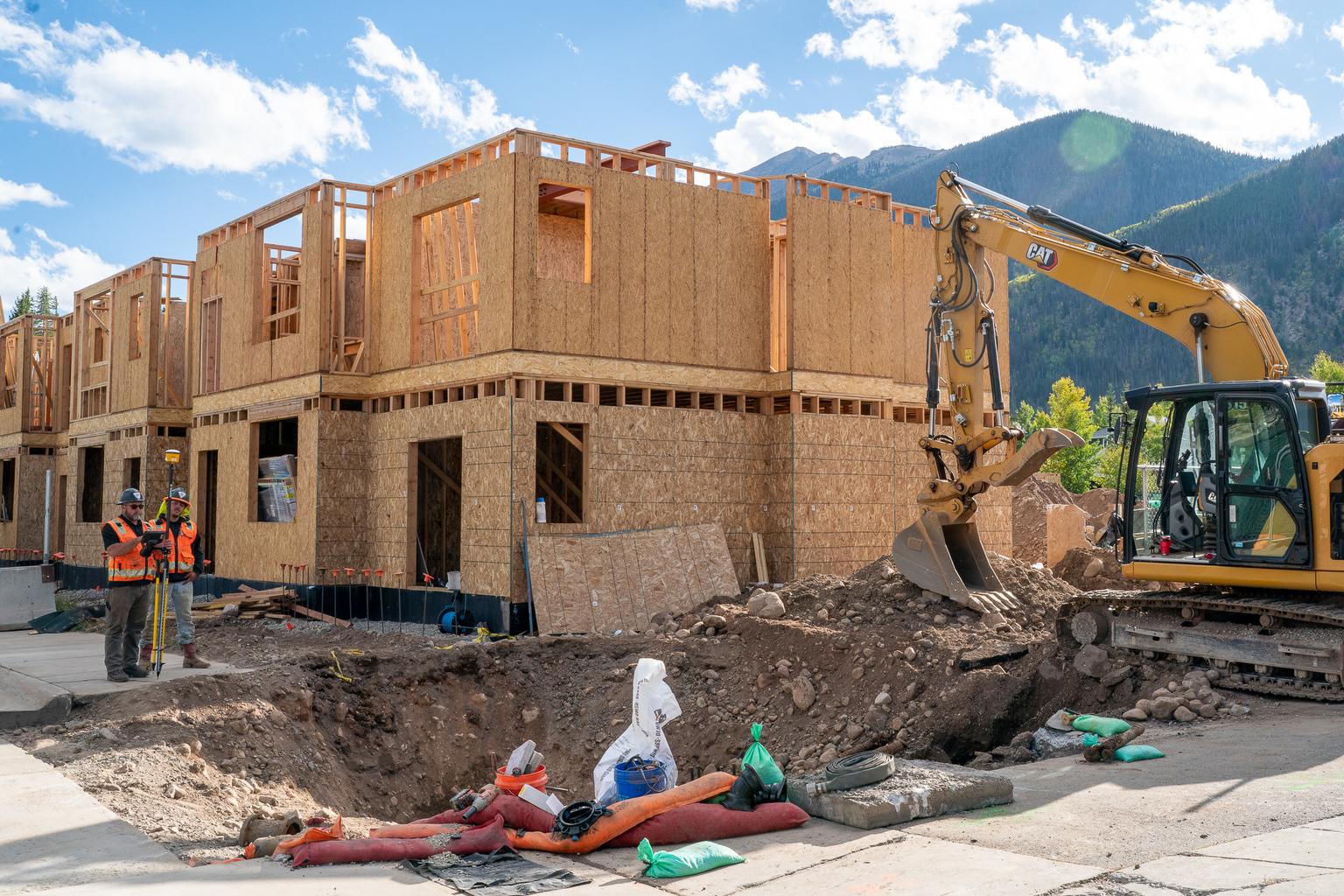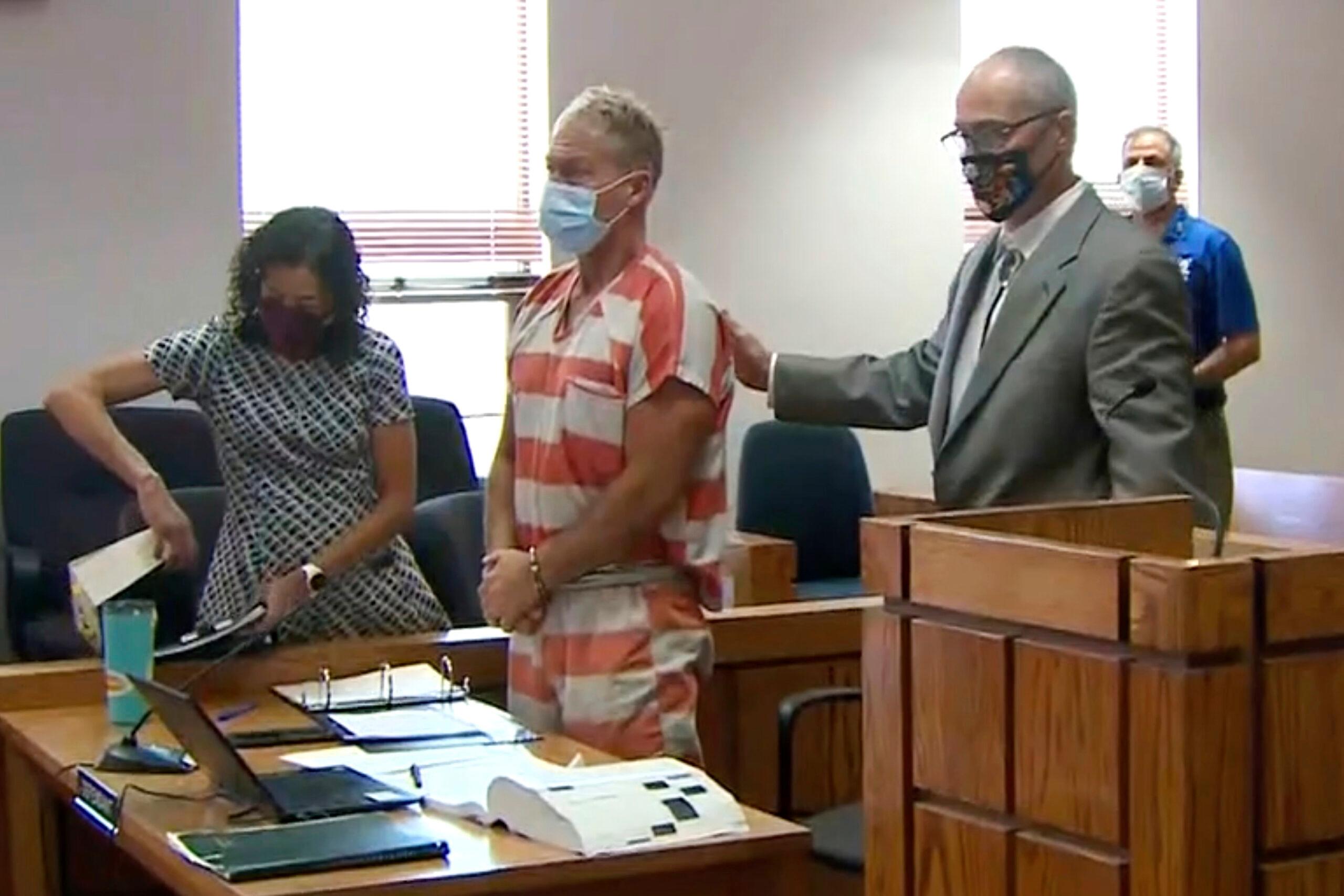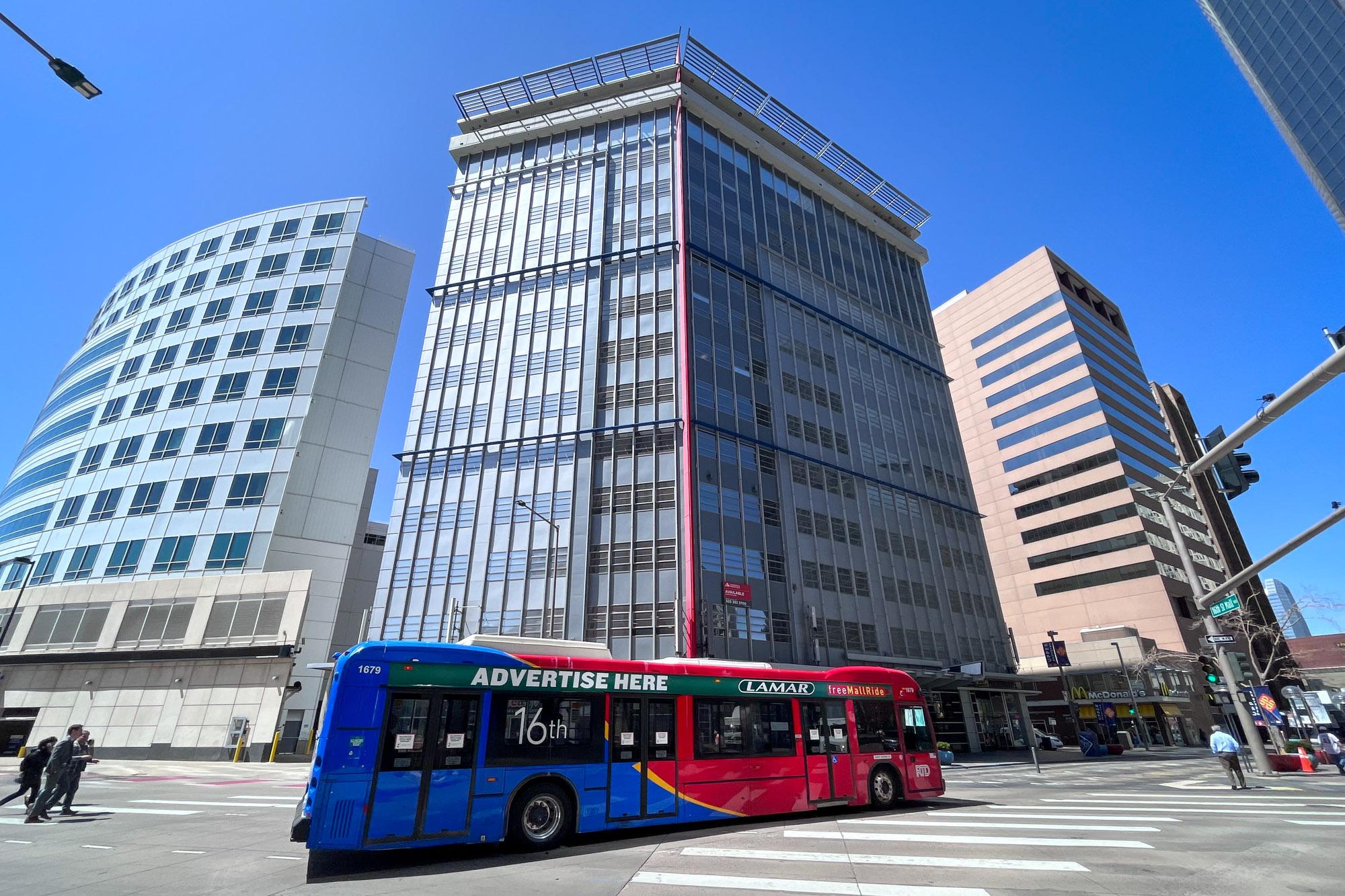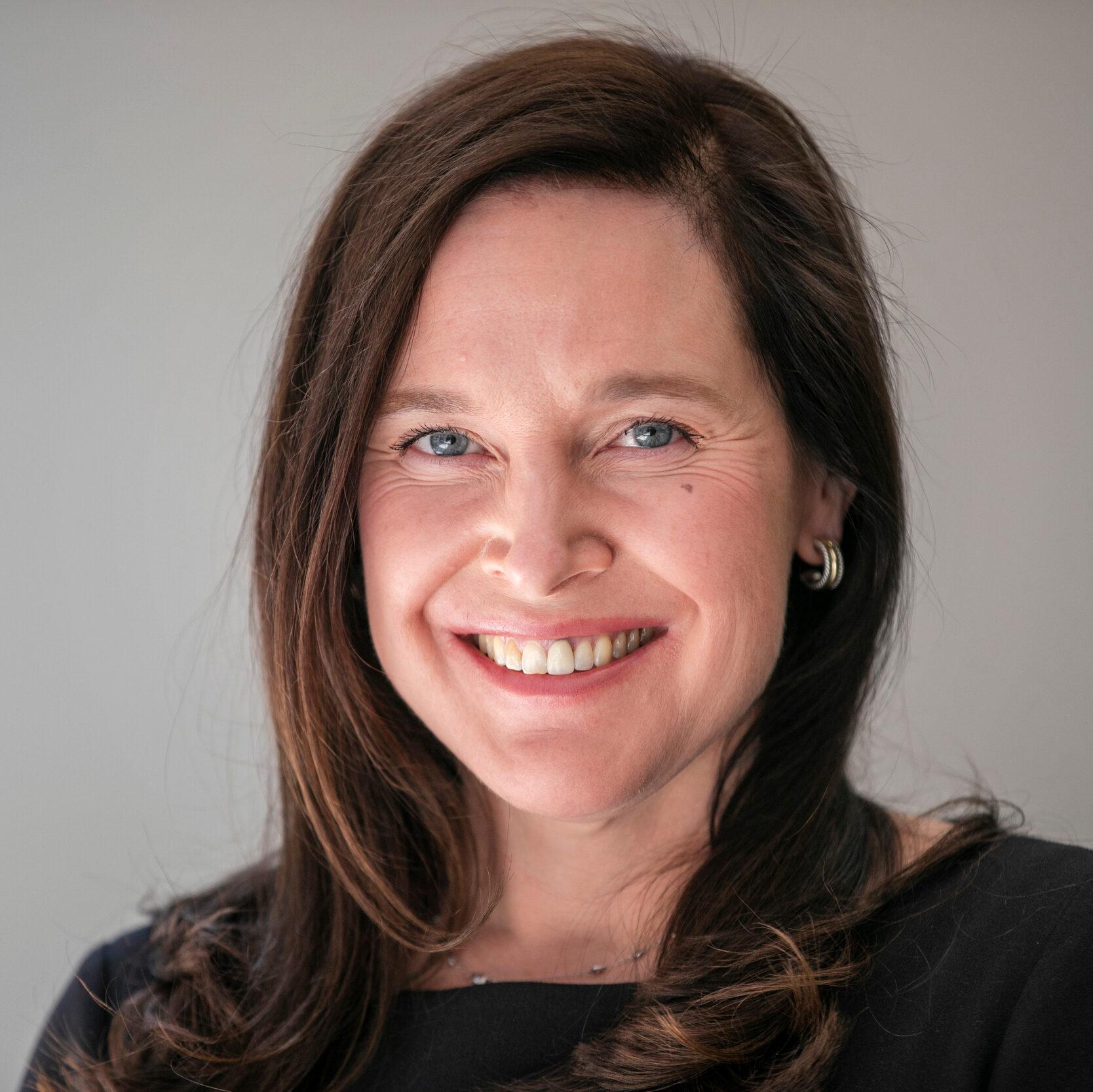
Democratic Gov. Jared Polis plans to renew his push for land use reform during the next legislative session, saying he thinks public support is growing.
Polis told Colorado Matters senior host Ryan Warner that rising interest rates are adding to the financial burden faced by homeowners who are already dealing with steep housing prices.
The average home price in metro Denver is $600,000, Polis said. “That $600,000 today is about 40 percent more expensive than $600,000 two years ago because of mortgage rates and interest rates, and that's how people experience home prices. It's the monthly mortgage rate you pay.”
The governor crafted a proposal last spring to give the state more authority over development and encourage construction of multi-family housing in major cities. Lawmakers abandoned the idea after fierce opposition from local governments that have traditionally set their own zoning and land use rules.
Polis said he’ll try again in 2024 – and push hard if he has to.
“I hope it's kumbaya rather than a fight...but we're always willing to have a fight if people want to fight us,” he said. “But it's much better if we come together and say, ‘Let's do something about high housing costs in Colorado and let's provide more low-cost homes.’”
The governor also spoke with Warner about a tax-relief measure on the November ballot and a recent state report on wrongdoing at so-called boarding schools that tried to strip the identities of Indigenous children.
This transcript has been edited for clarity
Ryan Warner: Proposition HH would lower property tax rates to blunt what would otherwise be steep increases. The trade-off is the measure would raise state spending limits under the Taxpayer's Bill of Rights. That cuts TABOR refunds significantly over time and could send more money to schools than they'd be losing. If the goal is to reduce property taxes, why not just lower the rate?
Polis: I'm for all of the above, so absolutely lower the rate. There's been some jurisdictions like Colorado Mountain College that have, but we need some kind of statewide property tax cut. This one, Prop HH is about $550 for an average home. Obviously, some people will have their $700, some will be $400, but the average is about $550.
For the following year after, the TABOR surplus would be reduced by about $46. So it's a good deal and also puts a mechanism in place called Truth in Taxation to cap property tax increases going forward at the rate of inflation, requiring a vote of the governing board if they want to waive that.
So it puts a default in place. Utah has this, it's been very effective in keeping property tax values down over time. So I really charge the legislature with doing three things with this: Immediate relief for homeowners, number one. Number two, address the inequities of the Gallagher Amendment, which was repealed, which effectively made the rate that small businesses pay much higher, so this provides additional relief to businesses which will lead to higher salaries, more employment; and then finally provide a mechanism to prevent property tax rates from going up too much in the future, and that's the Truth in Taxation. So it's a good package. It not only will save people money next year, but it'll save people money in the long run.
Warner: Package is the right word. I read the Blue Book voter guide on the bus this morning; 13 pages of analysis, seven charts, a QR code that links to an online calculator. Even in high turnout years, there's a challenge of getting people to fill in single bubbles beside candidate names. Is this good governance to ask all of that of a voter?
Polis: Prop HH is one of those initiatives that the more you learn about it, the more you like it. Yes, property tax is complicated. There's over 2,000 property tax-collecting districts in the state – not only every school district but fire districts, library districts. So when you're making a policy that encompasses and addresses over 2,000 districts, of course it needs to be thoughtful and it needs to make sure we can protect ourselves from fire. We fund our schools. We provide property tax relief everywhere. Some of that is then backfilled by the state out of surplus funds. A simple solution isn't always the best solution and the more people learn about HH and the fact that it'll keep property taxes low, the more they like it.
Warner: Well, the more these two local government lobbying groups read it, the less they like it: the Special District Association and the Colorado Municipal League. They oppose HH and these are groups whose residents presumably would benefit from lower property tax rates. CML says it's opposed because of the unnecessary constraints on municipal authority and the restriction of municipal tax revenue.
Polis: Yeah, of course. Cities want to tax you as much as they can and we're saying that they can't. It shouldn't surprise anybody that your city, not that they necessarily are going to raise your taxes, but they want the right to raise your taxes. And yes, we're putting some encumbrances on that because we want to keep property taxes low for everybody.
Warner: The measure does dedicate a maximum of $20 million a year to renter relief. Now that's compared to hundreds of millions or billions for property owner relief. We speak as rents and evictions are rising fast in many communities. Why should renters vote for this when it seems like there's not much in it for them and they're going to see their TABOR refunds shrink?
Polis: In many ways renters have the most at stake because if you're a landlord and your property tax bill increases 40 percent, you pass that along to your renters. I've never met the landlord who out of the goodness of their heart just absorbs their property tax increase. In commercial leases, it's passed along formally. So if you're a small store on Main Street and the owner’s property tax goes up as part of your lease it is passed directly along to you, and that's what we face if Prop HH doesn't pass.
Warner: $20 million a year for renter relief though is a drop in the bucket when you compare it against the property owner relief, no?
Polis: Well, I would add that we're very interested in doing more for lower-income families on housing stability. So I'll just add as an example, we funded the Child Tax Credit for the first time in Colorado history, we increased the Earned Income Tax Credit. Of course for low-income Coloradans, their number one expense is rent.
Warner: A verdict will come sometime soon in the first of three trials concerning the death of Elijah McLain in police custody in Aurora in 2019. After enormous public pressure, you directed the state attorney general to reopen the case. How closely have you followed this trial in Adams County of two officers?
Polis: So I follow it in the paper, but it's firmly on the judicial side. This is not something that should have any influence from elected officials, governor, state senator,
I wanted to make sure a second set of eyes looked at it. The attorney general did. Charges were brought. It's now being played out in a courtroom, appropriately so, and a verdict will be rendered.
Warner: Let's talk about guns. A new law took effect October 1st requiring a three-day waiting period on gun purchases. Rocky Mountain Gun Owners immediately sued saying three days is arbitrary and that the Second Amendment implies the right to possess arms that people have acquired. That law remains in effect, at least until a hearing later this month. When you signed this bill, did some part of you wonder whether it would be overturned by the courts?
Polis: So gun safety is part of a comprehensive approach we have to make Colorado one of the ten safest states. That's our goal – significantly reducing the crime rate, improving public safety.
We funded recruitment and retention of law enforcement, co-response models and youth interventions. We have a number of initiatives around reducing recidivism, meaning when people are released from prison (there are) programs to reduce the likelihood they'll commit a crime again.
Of course, gun safety is part of that. In particular around the waiting period, many states have this, even red states like Florida have a waiting period, Illinois, California, many of them have had them for decades. This can help reduce crimes of passion and suicides without inconveniencing in a significant way gun owners, because most people are going to plan ahead if they're going to go hunting or recreational shooting more than three days.
Of course it makes sure that in the spur of the moment, if you show up at a gun store and say, ‘I need a gun right now,’ that there's a chance to cool down there and a chance to do the background check, which usually takes hours but there have been times where it's taken two or three days as well when there's a backlog.
Warner: But that assumes that the courts let it stand.
Polis: Oh yeah. There's an active discussion in the courts and you mentioned the age. We have another (new law). Previously in Colorado you had to be 18 to buy a rifle, 21 to buy a pistol. We just said, ‘Hey, 21 for everything.’ That one has been stayed in the courts.
Warner: Indeed.
Polis: Absolutely. And I would say we are interested in doing things that are defensible, that we have a strong likelihood of succeeding in defending. Nothing is ever certain, but I think that certainly around the three-day waiting period and the age 21 requirement, we have a reasonable chance of succeeding in the courts and a very strong defense that we're working with Attorney General Phil Weiser to mount.
Warner: A reasonable chance. You don't feel hamstrung then?
Polis: Well, you never know, Ryan, right? I feel that when you're coming up with a gun safety law you want to make sure it's defensible and not just symbolic. If it's symbolic and you know you're going to lose, what's the point of doing it?
Warner: The state is finally acknowledging its role in a really awful chapter when so-called boarding schools tried to strip the identities and cultures of Indigenous children. This was around the turn of the 20th Century.
Colorado State archeologists put out a report after a year-long investigation. We ask the president of the Navajo Nation, Buu Nygren, if he'd like an apology from the state since so many Navajo children wound up in these institutions in Colorado.
Buu Nygren, president of the Navajo Nation: I think if they're willing to, our nation and our people would really appreciate it. It just acknowledges the history and they kind of own the scenario and then move on from there. So, I think an apology would be great if they could do it. I'm not going to pressure people to issue an apology.
Warner: (To Polis) Have you thought of a formal apology like the one the state finally issued in 2014 for the Sand Creek Massacre?
Polis: I just last week met with the two land-based tribes in Colorado, the Southern Ute and the Ute Mountain Ute. It was on the eve of the publishing of the report (and) we discussed that with them.
I also, along with Lt. Gov. Dianne Primavera, paid a private tribute to victims at one of the grave sites that was near one of the schools. There were many students that were casualties, some of disease, some of perhaps maltreatment.
We're still investigating all of this as well. I would say that the initial report is a starting point, not an ending point. It’s a good, thoughtful report that raises a lot more questions that still need answers about exactly what happened during this dark era. I would also say that we're very interested in working with the tribes to rebuild a strong future that supports their culture moving forward.
One of the most exciting things I got to do when I was visiting is visited the Kwiyagat Academy, which is a charter school run by the tribe that teaches the Ute language as part of their curriculum, publicly funded by the state of Colorado as charter schools are through the Charter School Institute. We also helped them find some state grants to set it up.
So I think making it up in deed and saying, ‘Not only now is the federal government not actively trying to wipe out the language as it did perhaps for your grandparents' generation of the kids there, but we were now fully supporting a public school that spends part of the day teaching Ute language, heritage and culture to the next generation of Utes.’
Warner: That doesn't answer the question about a formal apology.
Polis: Well, I think what's most important is what's being done. The fact that there is now a Kwiyagat, state-of-Colorado-funded school that is helping kids learn Ute, an opportunity that many of their parents or grandparents might not have had, is addressing some of the dark history where the federal government made a deliberate effort to wipe out these languages and cultures.
Warner: And I'll ask just one more time. I think I hear you saying – I think my father uses the phrase ‘living amends,’ you make living amends to someone.
Polis: Well, that's what's most important at the end of the day, yes. It's about how you can address, first of all, historical reckoning, meaning we did the report, there's more work to be done identifying victims in cemeteries, identifying patterns of abuse, making sure we have a clear-eyed history of what occurred and that work has begun.
The report is a big step forward. There's more work to do. But secondly, how can we make sure that we celebrate our Indigenous cultures going forward, not just with words but in the form of, again, a publicly funded school run by members of the tribe?
Warner: As more is uncovered, as the understanding is deepened, do you think that process ends with a formal apology? Is it premature? Is that what you're saying?
Polis: I think it's a question of apology from who and what it means. The federal Bureau of Indian Affairs obviously has a lot of culpability. I think additional work around what is the culpability around officials in Colorado, whether they were state commissioners, whether they were governors. So again, I think the work around finding responsible parties and making sure that everybody in office today completely disavows the immoral work of the past is critical. But as you said, it's also about making amends.
Warner: We asked listeners to suggest questions for you, and Susan Lake asks what you can do about homelessness, which is an issue statewide. In metro Denver, specifically it's up 33 percent over the last year, as many as 28,000 people without a roof over their heads over the course of a year. Does the state have a more immediate role than reshaping zoning and housing and land use policies as you've tried to do, unsuccessfully?
Polis: Yeah, and hopefully with more success in the future.
Obviously, we have many cities that are dealing with homelessness: Denver, Aurora, Colorado Springs, Boulder, but also Thornton, Westminster, really every major city is dealing with this issue in different ways. The state does not have authority, obviously, to act in a city with regard to what their policies are, but we do have a responsibility and an opportunity to help, and that's exactly what we've done.
We've most recently invested $12.5 million in American Rescue Act funding, a federal origin of funds, we've invested them to the specifications of several cities, $24 million with supportive services for a regional navigation campus, so we are –
Warner: What's a regional navigation campus?
Polis: Effectively to help people who are homeless get the behavioral health they need, get a job, those kinds of assistance. So again, the state doesn't run these, nor am I advocating that we should, but we should help local governments fund and support the work they need to reduce homelessness.
Warner: You appeared at an event sponsored by the Colorado Sun news site and reporter Jesse Paul asked you ‘what would make Colorado better?’ And you said, for one thing, people should be safer. And you went on to say, quoting here, ‘These encampments and drug paraphernalia should not be a part of a safer Colorado.’ Will you elaborate on that for me and then tell us what you see as your role, specifically?
Polis: Sure. I think it’s obvious that drug paraphernalia on the street represents a danger, especially for kids who might not know what it is. I would say that when we look at making Colorado one of the 10 safest states … I've expressed that goal publicly: we want to make Colorado one of the 10 safest states. At the time, it was in five years, now we have four years. We are in the middle of the pack and that's not good enough. That means property crime, violent crime, we need to reduce.
There's no silver bullet. It's comprehensive solutions. What we've talked about and continue to talk about is everything from grants to local law enforcement for recruitment and retention of law enforcement, supporting co-response models, which means a behavioral health specialist should show up rather than a cop, if that's what the response needs. Youth intervention programs, reducing gun violence, reducing domestic violence. So it's really a thoughtful, data-driven, comprehensive approach. We're always focused on, ‘What has worked in other places? How can we apply that in Colorado to make Colorado safer?’
Warner: Is there a conflation there of the homeless issue and public safety?
Polis: Well, as I said in that remark that you quoted, obviously things like drug paraphernalia can be dangerous on the streets, people that are having behavioral health issues can also have periods of time where they can be a danger to themselves or others, and might need to have a medical intervention or behavioral health intervention. So public safety is a very broad topic. Auto theft, drugs, certainly part of it. Domestic violence, gun violence, school safety, which we increased funding for school safety. So there's not any one piece to it, and we're interested in tackling all those drivers that can improve public safety in Colorado.
Warner: Let me pick up on a turn of phrase you used, that you hope to have more success in the future, and you were speaking of the state playing a greater role in local land use decisions.
Polis: Yeah, and –
Warner: So are you teeing up a similar fight or a similar campaign for the next session?
Polis: Well, first of all, it's not exactly how I'd frame it. I don't think the state should play a bigger role. I think that homeowners and property owners should be able to play a larger role, unfettered by local regulations that prevent housing, that are anti-housing or exclusionary, and we need to figure this out for our state.
The average home price in the Denver metro area is close to $600,000, but there's a major asterisk on that: that $600,000 today is about 40 percent more expensive than $600,000 two years ago because of mortgage rates and interest rates. That's how people experience home prices: it's the monthly mortgage rate you pay. Obviously, if you're paying rent, it's still a function of somebody's mortgage if they have a mortgage on the property.
So we need to remove artificial constraints on supply. We've really been listening across the state and Grand Junction, Pueblo, Fort Collins, really everywhere I go, housing is at the top of the agenda and it's the biggest frustration Coloradans have. And we'll be very excited to work with the legislature, work with local leaders to really establish a solution that works for Colorado to allow for more housing now, for all budgets.
Warner: You are picking this fight back up in the next session?
Polis: Well, I hope it's a kumbaya rather than a fight, Ryan, but we're always willing to have a fight if people want to fight us. But it's much better if we come together and say, ‘Let's do something about high housing costs in Colorado and let's provide more low-cost homes.’
What is a low-cost home? Multi-family, accessory dwelling units like a grandmother's flat, duplexes, quadplexes, these are all inherently more affordable than one home on a plot of land. And so, how could we enable more homes in the $200,000s, the $300,000s to be built and sold or put for rent, rather than just the inventory we have? Again, if people want $600,000 and $700,000 homes and can afford them, God bless them, they'll be there. But let's also create more inventory that's less expensive.
Warner: What changes in the next session to make it possible this time?
Polis: Well, I think Coloradans are just more frustrated now about the high cost of housing. I think the fact that interest rates have increased so much and mortgage rates since the last discussion.
Warner: So, you feel you have a greater bully pulpit because of the populace?
Polis: Well, yeah. It's not so much my bully pulpit. This is everywhere I go. This is what people want to happen. It's not just the Denver metro area: this is in Pueblo, in Colorado Springs, in Grand Junction. Housing, housing, housing costs. This is number one, number two, number three out of everybody's mouth. It was an important issue, what is it, a year and a half ago when we started to talk about it? And obviously, Colorado would certainly be in a better place if we had taken action then because some of the new more affordable homes could have been built by now. But we obviously need to make progress as a state.
As I laid this out before, progress is inevitable. It's just a question of will you let Colorado get as bad as California before you take action? Because now, California's taking some of these steps. Now they have cities with $1 million home prices, and now they're finally allowing more multi-family and accessory dwelling units. It's 15 years too late for California. So, Colorado can do nothing, despite our best efforts, and they're going to do these reforms anyway in eight or nine years. But then yes, the average home price will be $1 million by then, or we can get a little bit ahead of the curve and grow in a way that reduces traffic, has cleaner air, more affordable options to live near where jobs are, less commuting time, and more water efficiency. And I vote for that. I think most of the people of Colorado do too.
Warner: You are vice chairman of the National Governors Association, which has a new campaign called Disagree Better.
I'll read the description: ‘Americans need to disagree better, and by that we don't mean that we need to be nicer to each other, although that's helpful: we need to learn to disagree in a way that allows us to find solutions and solve problems instead of endlessly bickering.’
You did a little video with Republican governor Spencer Cox of Utah called Saving Your Family Dinner. The two of you have an exchange setting this up with the “MAGA uncle” and the “woke niece” spouting stuff from social media, and then you and Governor Cox summed up this way:
Polis: Our nation was founded by people who profoundly disagreed.
Utah Gov. Spencer Cox: So, the next time your uncle, your niece, or anyone else brings up that one topic that just drives you nuts, take a deep breath, be curious, ask questions.
Polis: If you still disagree, that's okay, but you might find that you aren't as far apart as you think.
Warner: Governor, where this breaks down for me is when the disagreement is over something like the Big Lie, or whether climate change is human-caused, or the existence of trans people. So I'm curious how you, Jared Polis, bring those listening skills to bear in arenas on issues like that.
Polis: We have a very diverse state in Colorado, and I mean diverse in its political culture. Look at our congressional delegation, ranging from Rep. Lauren Boebert, to Diana DeGette here in Denver, to my representative Joe Neguse, and others.
We have Coloradans of all persuasions. And yes, everything that you just indicated in that question, we have Coloradans who believe those things, we have Coloradans that don't. We have Coloradans that look at facts, we have Coloradans that don't, we have Coloradans that choose their own facts. So what we talked about, and we are talking about with the National Governors Association, is really equipping people with the tactics and best knowledge from communication science about how to engage with and have real conversations with others with whom you disagree.
Warner: Can you give me an example?
Polis: Sure. I have 10 of them here in front of me. I'll only go through three or four.
Warner: Okay, I'll take one.
So it's about connecting. Before getting to the content of the disagreement, establish a relationship of trust. So, what is that you have in common on that value level? You know what? I firmly believe that very conservative families still love their children just as I love my children. So, let's try to get to that point where you have that connection.
And give face. Disagreements can become toxic if they're just status battles or if you're hiding behind a screen name online.
Warner: Oh, That means don't be anonymous.
Polis: Get in the same room and have the discussion. It's a lot harder to dehumanize somebody that you're talking to than it is just a name on a computer screen that people often dehumanize as a person.
Warner: Okay, one more.
Polis: One more. And this is important and it's hard, but only get mad on purpose. No amount of theorizing can prepare us for the emotional experience of disagreement, and sometimes your worst adversary is yourself. So, there can be times when anger can be legitimate, but never let your emotions overwhelm your communications and desire just because, for instance, you have an uncle who's MAGA. Again, maybe you love him. Maybe you have a lot of experiences in common and try to build off of those rather than just start with, ‘Do you believe in the Big Lie?’









